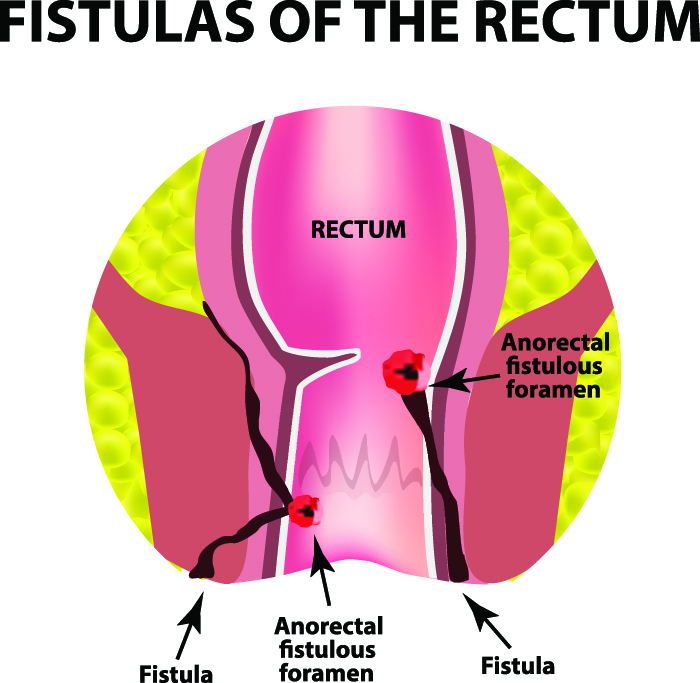Fistulas Treatment in Koramangala, Bangalore
Fistulas are unnatural connections in the body, caused by injury, surgery or severe inflammation from an infection.
Depending on the location of a fistula, the symptoms you experience may vary. For example, an anal fistula may cause you pain and swelling around the anus and you may notice discharge of blood or pus.

What do we need to know about fistula?
In simple terms, a fistula is a passageway connecting parts of the body that are not supposed to be connected. Fistulas can form between walls of different organs or between an artery and a vein.
Inflammatory bowel diseases or prolonged obstructed childbirth can also lead to formation of fistulas. They do not heal on their own, therefore it is recommended that you seek fistula treatment in Bangalore if you notice symptoms.
What are the types of fistula?
Fistulas are tunnels that connect various parts of the body and can be:
- Blind: A fistula that is open at one end only
- Complete: An open fistula that connects an organ to the skin surface
- Horseshoe: A fistula that connects the anus and the skin by going around the rectum
- Incomplete: A fistula that is open at the skin but closed internally
The most common types of fistulas are:
- Anal fistula: A fistula that develops on the skin around the anus due to an infection of the anal gland. Anal fistulas are treatable through surgery.
- Obstetric fistula: A tunnel between the vagina and the rectum. Obstetric fistulas are commonly caused by childbirth injuries. They require medical diagnosis to determine if surgical removal is necessary.
- Arteriovenous fistula: A connection between an artery and a vein that bypasses capillaries. They usually occur on arms or legs. Arteriovenous fistulas are chronic and can be lifelong. They require medical diagnosis.
What are the symptoms of fistula?
Based on the location of fistulas, patients experience different symptoms.
- Anal fistula
- Pain and swelling around the anus, painful defecation
- Discharge of pus or blood
- Obstetric fistula
- Foul smell from vaginal discharge
- Passage of stool from the vagina
- Arteriovenous fistula
- Smaller arteriovenous fistulas do not have any symptoms
- Bigger fistulas cause purplish veins that bulge on the skin, decrease in blood pressure and fatigue
What causes fistulas?
Some of the most common causes of fistulas are:
- Injury
- Surgical complications
- Inflammatory infections
- Cancer
- Radiation therapies
- Childbirth complications, lack of medical attention
- Inflammatory bowel diseases such as colitis or Crohn’s disease
If you notice symptoms like bloody discharge from your anus or incontinence after childbirth, or bulging veins (that look like varicose veins) on arms or legs accompanied by fatigue, it is time to visit a fistula hospital in Bangalore.
You can request an appointment at Apollo Spectra Hospitals, Koramangala, Bangalore.
Call 1860 500 2244 to book an appointment.
What are the risk factors for fistulas?
The most prevalent risk factor for a fistula is the lack of timely medical attention and care. Prolonged labor with lack of obstetric care, trauma to bodily organs and chronic inflammatory bowel diseases often put patients at increased risk of developing fistulas.
Are there any complications from fistulas?
Fistulas, if left untreated for a long time, can increase the risk of developing cancer. Patients may also be at risk of developing sepsis due to bacterial infections resulting from untreated fistulas.
How do we treat fistulas?
This condition requires the attention of a fistula specialist. Fistulas are treated differently depending on their location and severity.
- Anal fistula: The most effective treatment for anal fistulas is fistulotomy. This procedure involves cutting along the length of the fistula to open it. It then heals as a flat scar. Depending on its severity and nature, fistula doctors in Bangalore may recommend other procedures like the seton technique, endoscopic ablation, fibrin glue treatment or using bioprosthetic plugs.
- Obstetric fistula: Some obstetric fistulas heal on their own. Surgery is an effective method of treating obstetric fistulas.
- Arteriovenous (AV) fistula: Some AV fistulas heal on their own. Depending on its severity, fistula doctors may recommend surgery or medical procedures like ligature and embolization to treat AV fistulas.
Conclusion
Fistula is a painful condition that results from neglect and improper medical care. About 50,000 to 1,00,000 women worldwide experience obstetric fistulas every year. If left untreated, fistulas can be fatal.
It is thus recommended to seek opinion from a fistula doctor as soon as you notice the symptoms. Getting timely treatment for fistulas is imperative.
If a fistula leads to the skin surface, it can be diagnosed by physical examination of the painful area. If not, a fistula doctor will prescribe either a CT scan or an MRI to detect the location of the fistula. Further tests may be needed for exact diagnosis based on the location of the fistula.
Fistulas cannot be treated with medicine alone. However, antibiotics may help the process of surgical removal based on your doctor’s diagnosis.
Yes. Treatment with fibrin glue is the only non-surgical option for the treatment of fistulas currently.
Symptoms
Our Top Specialities
NOTICE BOARD
CONTACT US
CONTACT US
 Book Appointment
Book Appointment


.svg)
.svg)
.svg)
.svg)








